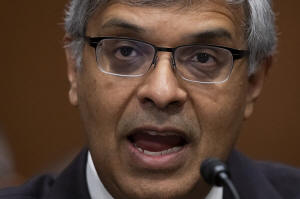Trump nominee to lead National Institutes of Health questioned on
funding cuts, vaccines
[March 06, 2025]
By LAURAN NEERGAARD
WASHINGTON (AP) — A health economist who once famously clashed with
officials at the National Institutes of Health and now is the nominee to
lead the agency faced questions from senators from both parties
Wednesday about drastic funding cuts and research priorities.
Dr. Jay Bhattacharya, a Stanford University professor, was an outspoken
critic of the government’s COVID-19 shutdowns and vaccine policies. Now
he’s poised to become director of the NIH, long called the government’s
crown jewel, as it faces mass firings and drastic funding cutbacks.
“I love the NIH but post-pandemic, America’s biomedical sciences are at
a crossroads,” Bhattacharya told senators.
He laid out priorities including a bigger focus on chronic diseases,
including diabetes and obesity. But he also said the agency needs to be
more open to scientific dissent, saying influential NIH leaders early in
the pandemic shut down his own criticisms about responses to COVID-19.
While Republicans warmly welcomed Bhattacharya, Sen. Bill Cassidy of
Louisiana, who chairs the Senate health committee, pressed him about
vaccine skepticism that is fueling a large measles outbreak that already
killed a child in Texas.
Cassidy strenuously urged Bhattacharya not to waste NIH dollars
reexamining whether there's a link between standard childhood vaccines
and autism. There's no link — something that's already been proven in
multiple studies involving thousands of children, the senator stressed.
Bhattacharya called the measles death a tragedy and said he “fully
supported” children being vaccinated but added that additional research
might convince skeptical parents.

"People still think Elvis is alive,” a frustrated Cassidy responded. He
told Bhattacharya any attempt to revisit the debunked issue would
deprive funds to study autism's real cause.
Some Senators, including Sen. Susan Collins, a Republican from Maine,
and Tammy Baldwin, a Democrat from Wisconsin, expressed deep frustration
that turmoil at the nation’s largest funder of medical research — mass
firings and funding cuts and freezes — threatens the development of
cures and new treatments for cancer, Alzheimer's disease and host of
other disorders. They pushed Bhattacharya about how he'd reverse those
losses, including one set of funding cuts — currently paused by a
federal judge — that they said is forbidden by a congressional spending
law.
[to top of second column]
|

Dr. Jay Bhattacharya, President Donald Trump's choice to be Director
of the National Institutes of Health, appears before the Senate
Health, Education, Labor, and Pensions Committee for his
confirmation hearing, at Capitol Hill in Washington, Wednesday,
March 5, 2025. (AP Photo/Ben Curtis)
 Bhattacharya said he'd had no part
in those cuts and if confirmed as NIH's director, he'd look
carefully at the concerns to make sure researchers “have the
resources they need.” He also said some of the Trump
administration's cuts are a signal of distrust of science.
Until recently, the $48 billion NIH had strong
bipartisan support. NIH scientists conduct cutting-edge research at
its 27 institutes specializing in diseases including cancer, chronic
illnesses such as heart, lung and kidney disease, aging and
Alzheimer’s. Most of the agency’s budget is dispersed to
universities, hospitals and other research groups through highly
competitive grants to conduct everything from basic research to
clinical trials.
NIH-funded research has played a part in the development of most
treatments approved in the U.S. in recent years.
Bhattacharya gained public attention as one of three authors of the
Great Barrington Declaration, an October 2020 open letter
maintaining that pandemic shutdowns were causing irreparable harm
and argued that people at low risk of COVID-19 should live normally
while building up immunity through infection.
At the time -- before vaccinations had begun – that view was
embraced by some in the first Trump administration but was widely
denounced by infectious disease experts. Then- NIH director Dr.
Francis Collins called it dangerous and “not mainstream science.”
Bhattacharya became a plaintiff in a Supreme Court case, Murthy v.
Missouri, arguing he was “unfairly censored” on social media as part
of government efforts to combat misinformation. While the case
gained national attention, it was ultimately unsuccessful in a 6-3
ruling.
Bhattacharya, who will face a vote of the full Senate at a later
date, holds a medical degree but is not a practicing physician. His
own research on the economics of health care has been funded by the
NIH.
All contents © copyright 2025 Associated Press. All rights reserved |